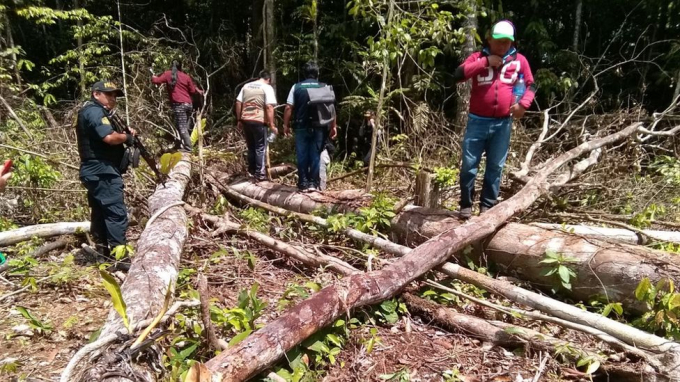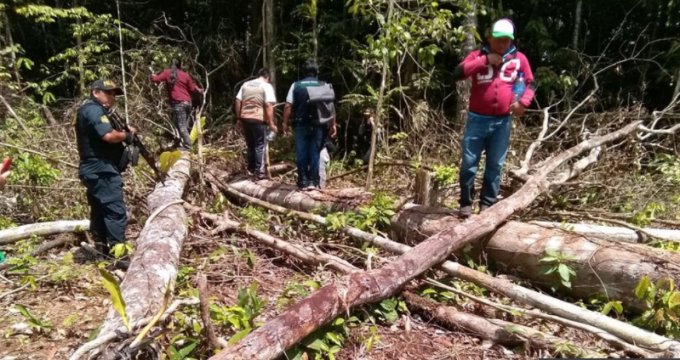May 22, 2025 | 04:46 GMT +7
May 22, 2025 | 04:46 GMT +7
Hotline: 0913.378.918
May 22, 2025 | 04:46 GMT +7
Hotline: 0913.378.918

Community leaders are joined by environmental enforcement agents to investigate an illegal rainforest clearing on their territory. Photo: BBC
Indigenous people living in the Peruvian Amazon were equipped by conservation groups with satellite data and smartphones.
They were able to reduce tree losses by half in the first year of the project.
Reductions were greater in communities facing threats from illegal gold mining, logging and drugs.
Over one-third of the Amazon rainforest lies within the territory of approximately 3,344 acknowledged indigenous communities.
But for decades, these areas have been under attack from outsiders who are determined to cut down trees for a range of purposes including mining, logging and the planting of illicit crops like the coca plants used to manufacture cocaine.
Over the past 40 years, governments and environmentalists have invested heavily in the use of satellite technology to monitor the removal of trees.
Governments in Brazil, Peru and Colombia have put in place a system of high-resolution deforestation alerts, but there is little evidence that this information reaches the indigenous communities most affected.
This new research set out to see if putting information directly into the hands of forest communities would make a difference.
In this randomised, controlled study, the authors identified 76 remote villages in the Peruvian Amazon, with 36 randomly-assigned to participate in this new monitoring programme.
Thirty-seven other communities served as a control group and continued with their existing forest management practices.
Three members of each selected community were trained in the use of technology and shown how to carry out patrols to verify deforestation.
When satellite information showed suspected deforestation activity in an area, photos and GPS coordinates were loaded onto USB drives and carried up the Amazon river and delivered by couriers.
The information was then downloaded onto specialised smartphone apps which would guide the community monitors to the suspected locations.
When the forest patrols confirmed any unauthorised deforestation, they would report back to a general assembly of community members to decide on the best approach.
In cases where drug dealers were involved, the community could decide to report the issue to law enforcement.
If the activity was perceived as less risky, community members could intervene directly and drive the offenders off their land.
When the researchers examined the impact of the new approach, they found that deforestation dropped by 52% in the first year, and by 21% in the second.
"It's quite a sizeable impact," said Jacob Kopas, an independent researcher and an author on the paper.
"We saw evidence of fewer instances of tree cover loss in the programme communities compared with control communities."
"On average, those communities managed to avert 8.8 hectares of deforestation within the first year. But the communities that were most threatened, the ones that had more deforestation in the past were the ones pulling more weight and were reducing deforestation more than in others."
Indigenous groups welcomed the research, saying it is among the first peer-reviewed studies to show the benefits of empowering local communities.
"The study provides evidence that supporting our communities with the latest technology and training can help reduce deforestation in our territories," said Jorge Perez Rubio, the president of the Loreto regional indigenous organization (ORPIO), where the study was carried out.
The scale of the problem of deforestation in indigenous areas is significant. Between 2000 and 2015, around 17% of tree loss in the Amazon occurred on nationally-protected or areas assigned to indigenous peoples.
This is expected to increase in the coming years.

Community leaders are joined by environmental enforcement agents to investigate an illegal rainforest clearing on their territory. Photo: BBC
"Over the next decade, if nothing changes, indigenous peoples in the Amazon Basin are projected to lose 4.4 million hectares of rainforest, mostly to outsiders who encroach on their territories to cut down trees," says Cameron Ellis, with the Rainforest Foundation US, who helped facilitate the study.
"But if the community-based forest monitoring methodology could be widely adopted and local governance strengthened, forest loss in the Amazon could be reduced by as much as 20% across all indigenous lands."
"If the approach were targeted to regions with high deforestation rates, forest loss in those areas could be cut by more than three quarters."
The study has been published in the journal Proceedings of the National Academy of Sciences (PNAS).
(BBC)

(VAN) Attempts to bring down the price of the Japanese staple have had little effect amid a cost-of-living crisis.

(VAN) Fourth most important food crop in peril as Latin America and Caribbean suffer from slow-onset climate disaster.

(VAN) Shifting market dynamics and the noise around new legislation has propelled Trouw Nutrition’s research around early life nutrition in poultry. Today, it continues to be a key area of research.

(VAN) India is concerned about its food security and the livelihoods of its farmers if more US food imports are allowed.

(VAN) FAO's Director-General emphasises the need to work together to transform agrifood systems.

(VAN) Europe is facing its worst outbreak of foot-and-mouth since the start of the century.

(VAN) The central authorities, in early April, released a 10-year plan for rural vitalization.